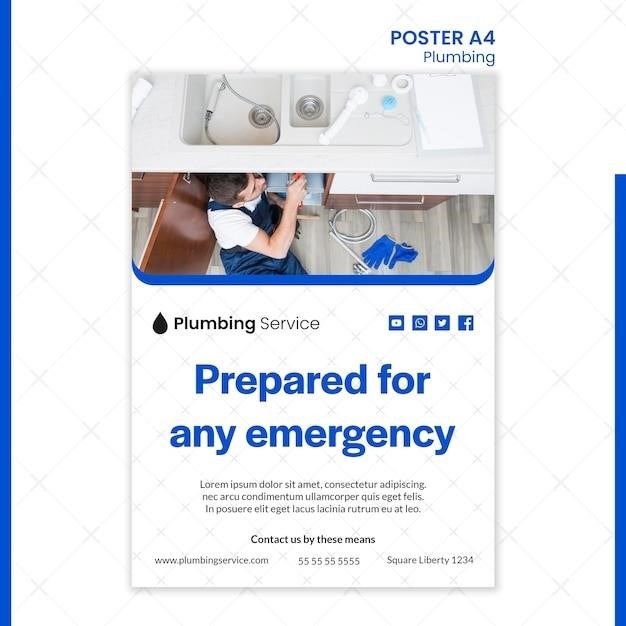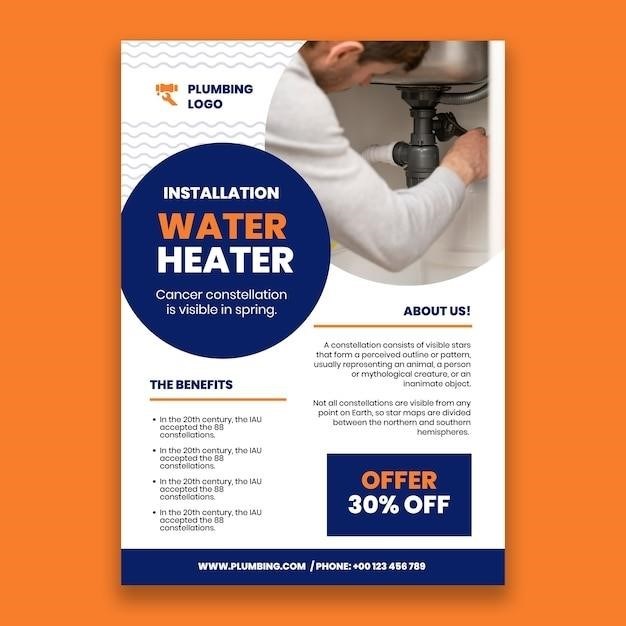
Understanding the Plumbing Aptitude Test
This test assesses aptitude for plumbing apprenticeships. It typically includes sections on reading, math, problem-solving, and mechanical comprehension. Practice tests and PDFs are widely available online to aid preparation.
Test Structure and Format
The plumbing aptitude test’s structure varies, but generally involves multiple-choice questions and possibly some hands-on components depending on the specific program. Common question types include mathematical problems related to measurements and calculations, reading comprehension passages about plumbing codes and practices, and logical reasoning scenarios involving plumbing systems. The time allotted is usually around two hours, with a significant number of questions (often exceeding 100). Some tests may incorporate spatial reasoning or mechanical comprehension sections focusing on diagrams and tools. The format aims to assess both theoretical knowledge and practical application skills deemed essential for success in a plumbing apprenticeship.
Topics Covered in the Exam
Plumbing aptitude tests encompass a range of subjects crucial for successful plumbing work. Expect questions on fundamental mathematics, including fractions, decimals, and geometry, essential for accurate measurements and calculations in pipe fitting and system design. Reading comprehension is vital for interpreting blueprints, codes, and technical manuals. Problem-solving skills are tested through scenarios requiring logical reasoning and practical application of plumbing knowledge. Mechanical aptitude might be assessed through questions on tools, machinery, and their functions. Knowledge of basic plumbing terms and concepts, as well as understanding of safety regulations, are also frequently included.
Time Allotment and Scoring
The allotted time for plumbing aptitude tests varies, but many are around two hours long. The number of questions also differs across tests, ranging from a few dozen to over one hundred. Scoring methods are not always explicitly detailed but usually involve a raw score reflecting the number of correct answers. Some tests may include weighting, giving more points to more complex questions; Percentile rankings or scaled scores might be used to compare performance across different test administrations or to set minimum passing scores. Practice tests often provide a simulated time limit and scoring system to help candidates familiarize themselves with the test format and pacing.
Preparing for the Plumbing Aptitude Test
Effective preparation is crucial for success. Utilize practice tests and PDFs focusing on key subject areas like math and reading comprehension. Develop strong study habits and time management skills for optimal performance.
Utilizing Practice Tests and PDFs
Numerous online resources offer plumbing aptitude test practice PDFs and quizzes. These invaluable tools simulate the actual exam format and question types, allowing you to familiarize yourself with the test structure and pacing. Working through sample questions helps identify your strengths and weaknesses, enabling targeted study in areas needing improvement. Regularly reviewing practice tests and analyzing your performance pinpoints knowledge gaps and enhances understanding of core concepts. Many free resources are available, supplementing paid prep materials. Remember to time yourself during practice sessions to build effective time management skills crucial for exam success.
Focusing on Key Subject Areas
The plumbing aptitude test typically covers several key subject areas; Mathematics, including calculations and conversions, is crucial. Strong reading comprehension skills are essential for interpreting technical diagrams and instructions. Problem-solving and logical reasoning abilities are tested through scenarios requiring practical application of knowledge. Mechanical comprehension, involving understanding of basic mechanical principles, is another vital component. Focusing your study efforts on these core areas ensures comprehensive preparation. Reviewing relevant codes and regulations further strengthens your understanding of industry standards and best practices.
Developing Effective Study Habits
Effective study habits are paramount for success on the plumbing aptitude test. Create a structured study schedule, allocating specific time slots for each subject area. Use a variety of study methods, such as flashcards for memorization and practice problems for application. Regular breaks are crucial to prevent burnout and maintain focus. Active recall, testing yourself regularly without looking at notes, is a powerful learning technique. Seek clarification on any confusing concepts. Consider studying with a partner or forming a study group for collaborative learning and peer support. Most importantly, maintain a consistent and disciplined approach throughout your preparation.

Key Subject Areas to Master
Mastering math, particularly fractions and decimals, is crucial. Strong reading comprehension and logical reasoning skills are also essential for success.
Mathematics and Calculations
The plumbing aptitude test often includes questions assessing your mathematical skills, particularly in areas relevant to the trade. Expect problems involving fractions, decimals, percentages, and basic algebra. You might encounter questions on calculating pipe lengths, determining areas and volumes, or converting units of measurement (e.g., inches to feet, gallons to liters). Practice solving these types of problems using sample questions found in online practice tests or study guides. Familiarize yourself with formulas for calculating areas of circles and other shapes, as well as volume calculations for cylindrical and rectangular shapes. Accuracy and efficiency in calculations are vital for success in the plumbing field and will be reflected in the test’s mathematical section. Remember to show your work clearly on practice problems to identify any weaknesses in your approach.
Reading Comprehension and Interpretation
A significant portion of the plumbing aptitude test focuses on your ability to understand and interpret written materials. This section may include passages describing plumbing systems, codes, or procedures, followed by multiple-choice questions testing your comprehension. Practice reading technical manuals, blueprints, or articles related to plumbing. Focus on identifying key information, understanding technical terminology, and drawing inferences from the provided text. Efficiently extracting relevant details from complex documents is crucial for success in the plumbing industry. Enhance your reading comprehension skills by practicing with various texts, paying attention to detail, and focusing on understanding the overall context and meaning. Online practice tests and study guides often include reading comprehension exercises to help you prepare effectively.
Problem-Solving and Logical Reasoning
The plumbing aptitude test will assess your ability to solve problems using logical reasoning and critical thinking skills. Expect questions that present scenarios requiring you to analyze information, identify patterns, and deduce solutions. These might involve troubleshooting plumbing issues, interpreting diagrams, or applying principles of physics or mechanics to practical situations. Practice solving logic puzzles, word problems, and spatial reasoning tasks. Familiarize yourself with common plumbing problems and their solutions; Online resources offer sample questions and explanations to help you improve your problem-solving and logical reasoning abilities. Developing strong analytical skills is key to excelling in this section of the test.

Practice Test Strategies
Effective time management is crucial. Practice tests help identify weak areas. Analyze mistakes to improve performance. Focus on understanding concepts, not just memorization.
Time Management Techniques
Effective time management is crucial for success on the plumbing aptitude test. Before starting, quickly scan the entire test to gauge its length and question types. Allocate your time proportionally to each section, considering the number of questions and their point values if applicable. If a question proves too challenging, don’t get bogged down; mark it for review and move on. Use any remaining time to review your answers and make any necessary corrections. Consistent practice under timed conditions will greatly enhance your time management skills for the actual test. Remember, efficient pacing is key to completing the exam within the allotted timeframe.
Approaching Different Question Types
Plumbing aptitude tests often incorporate diverse question formats. Multiple-choice questions demand careful reading and consideration of all options before selecting the best answer. Numerical problems require a methodical approach, showing your work to minimize errors. Diagram-based questions necessitate close attention to detail and the ability to visualize spatial relationships. Reading comprehension passages test your ability to extract key information and answer questions accurately. Practice diverse question types in your preparation to build confidence and proficiency in tackling each format efficiently and effectively on test day.
Reviewing and Analyzing Performance
After completing practice tests, thoroughly review your answers. Identify areas where you struggled and understand why you made mistakes. Analyze your performance in each section—mathematics, reading comprehension, problem-solving—to pinpoint weaknesses. Focus your study efforts on those specific areas to improve accuracy and speed. Don’t just focus on the correct answers; critically examine incorrect responses to grasp underlying concepts and avoid similar errors in the future. This detailed review process is crucial for maximizing your learning and improving your overall test performance. Effective review enhances your understanding and boosts confidence.
Resources for Test Preparation
Numerous online resources offer practice tests, sample questions, and study guides. Plumbing code and regulation resources are also valuable preparation tools. Utilize these to enhance your knowledge and skills.
Online Practice Tests and Quizzes
The internet provides a wealth of free and paid online resources designed to help you prepare for the plumbing aptitude test. Many websites offer practice tests mirroring the actual exam format, allowing you to familiarize yourself with the question types and time constraints. These online quizzes often cover a range of topics, including mathematics relevant to plumbing calculations, reading comprehension passages interpreting plumbing diagrams or specifications, and problem-solving scenarios requiring logical reasoning to troubleshoot plumbing issues. Some platforms provide detailed explanations for each answer, helping you understand the underlying concepts and improve your problem-solving skills. Regular use of online practice tests and quizzes can significantly boost your confidence and preparedness for the exam, allowing you to identify your strengths and weaknesses and focus your study efforts accordingly. Remember to choose reputable sources to ensure the accuracy and relevance of the practice materials.
Study Guides and Sample Questions
Supplementing online practice tests, comprehensive study guides offer a structured approach to plumbing aptitude test preparation. These guides often break down the exam into key subject areas, providing detailed explanations of concepts and offering numerous sample questions with solutions. This approach helps you grasp the underlying principles tested, not just memorize answers. Look for study guides that cover a wide range of topics, including basic math principles, reading comprehension strategies, and problem-solving techniques relevant to plumbing. Many guides incorporate realistic scenarios and questions, preparing you for the complexities of the actual exam. Access to sample questions allows you to practice under timed conditions, simulating the pressure of the real test environment. Thorough review of study guide materials and consistent practice with sample questions are crucial for success.
Plumbing Code and Regulations Resources
Familiarizing yourself with plumbing codes and regulations is essential for success on the aptitude test and in your future plumbing career. These resources provide detailed information on safety standards, installation procedures, and material specifications. Many online and print resources offer summaries and explanations of relevant codes, which can be invaluable for understanding the theoretical foundations tested in the exam. Access to these resources helps you learn the terminology and standards expected of a competent plumber. Understanding these regulations goes beyond simply passing the test; it builds a strong foundation for safe and compliant work practices throughout your career. Therefore, dedicate sufficient time to studying these resources; their mastery significantly increases your chances of success.